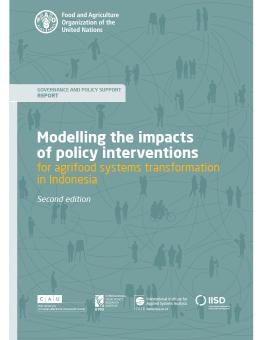
Modelling the Impacts of Policy Interventions for Agrifood Systems Transformation in Indonesia
This report explores Indonesia's agrifood systems transformation, offering insights from innovative economic models to guide policy-makers in developing effective, sustainable policies.
Indonesia's economic development has made great strides over the past couple of decades, with stable economic growth, rising incomes, and falling poverty. Despite these successes, the country's agrifood systems reflect several challenges that hinder efforts to further sustainable development in the country, including food insecurity, malnutrition, unsustainable agricultural practices, and deforestation and associated climate impacts.
The Indonesian government and the UN Food and Agriculture Organization (FAO) recognize that analyzing and modelling changes in agrifood systems is key to understanding governance issues as well as identifying the best policies, synergies, and trade-offs to support transformation efforts.
This report details an innovative modelling approach developed and piloted in Indonesia by researchers from the International Food Policy Research Institute, the International Institute for Applied Systems Analysis, IISD, and Kiel University. The approach uses three economic models to generate insights to aid policy-makers in creating technically sound and politically feasible interventions.
The report provides the context for agrifood systems transformation in Indonesia, describes the overall modelling approach, synthesizes the results of individual modelling activities, and distills these into overall findings.
It concludes with implications for policy-making and suggests next steps for agrifood systems transformation in Indonesia. The results and insights are expected to support efforts to translate Indonesia's commitments into concrete policy interventions and inform the Indonesian government's medium- and long-term development planning.
You might also be interested in
What's Next After COP 28: Food systems
Slated to be a game changer for food systems transformation, COP 28 ended with mixed results. Our expert unpacks the wins and disappointments for food systems and what’s needed next.
Food Systems and Agriculture: What’s on the menu for COP 28?
Our agriculture expert Claire McConnell explains the importance of food systems transformation in addressing climate change and how can it be achieved, particularly within the context of COP 28.
Country Diagnostic Report: Nigeria
This report provides an overview of the current economic, social, and climate (mitigation and adaptation) trends in Nigeria, as well as projections based on modelling.
Country Diagnostic Report: Ethiopia
This report provides an overview of the current economic, social, and climate (mitigation and adaptation) trends in Ethiopia, as well as projections based on modelling.